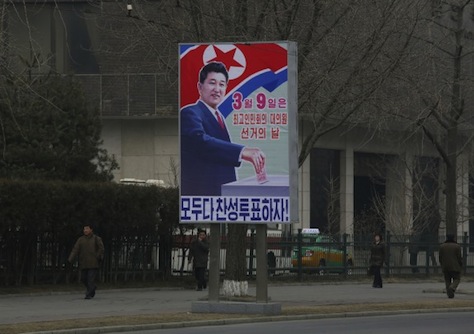There’s no country on the planet more autarkic or isolated than the Democratic People’s Republic of Korea.![]()
Last year, when Kim Jong-un decided to show that he was in charge, he executed his own uncle, Jang Song Thaek, who had been a top advisor to Kim’s father, Kim Jong-il. There’s no question that Dear Leader is running North Korea, however poorly he may be running it — it has a GDP of around $40 billion while South Korea has a GDP of $1.130 trillion.
But when North Korea holds elections on Sunday to determine the 687 members of the Supreme People’s Assembly (최고 인민 회의), voters will have just one choice — a candidate of the Workers’ Party of Korea (조선로동당), the long-governing party of North Korea. In some cases, voters may choose the candidate of either the Korean Social Democratic Party or the Chondoist Chongu Party, both of which govern in coalition with the Workers’ Party under the banner of the ‘Democratic Front for the Reunification of the Fatherland.’
Kim himself is standing in constituency #111 — an auspicious number! He will represent Mount Paekdu — how sacred!
Or whatever.
The Supreme People’s Assembly is certainly not the fount of power in North Korea; instead, it’s a rubber-stamp parliament that rarely even convenes.
Given the nature of power and government in North Korea, what could Kim possibly gain out of the expense and hassle of staging she elections? It’s not to gain a democratic mandate, because there’s no opposition (and there’s no way for North Korean voters to vote in secret against the government’s candidate). The elections are such a sham that they certainly aren’t being staged for showing the world that North Korea is acceding to the mechanisms of democratic legitimacy. I haven’t even listed North Korea’s election s on the 2014 electoral calendar because they so comically fall below the standards of anything we understand to be a valid election.
In contrast, elections for the Politburo Standing Committee of the Chinese Communist Party (中国共产党) in neighboring China seem like bona fide exercises in civic duty.
So what gives? There are at least three reasons why North Korea continues to go through the charade of holding ‘elections.’ Continue reading ‘Everybody votes in agreement!’ But why does North Korea bother?


